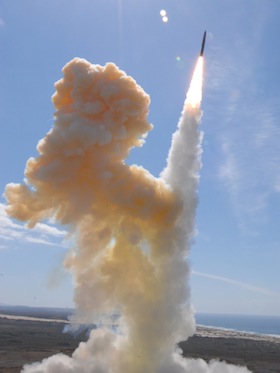Security Benefits From NATO-Russia Cooperation
July 26, 2011
Featured Image
Today's top nuclear policy stories, with excerpts in bullet form.
Stories we're following today: Tuesday, July 26, 2011.
How to Avoid a New Arms Race - Ivanka Barzashka, Göetz Neuneck , Timur Kadyshev, and Ivan Oelrich in the Bulletin of the Atomic Scientists [link]
- NATO is creating its own missile defense system -- instead of relying solely on the U.S. system.
- Regardless of the effectiveness of a NATO system and NATO assurances that its defenses are aimed exclusively at emerging threats, conservative Russian military planners will likely consider worst-case scenarios.
- Cooperation on defenses [between NATO and Russia] could reassure Russia that there is no threat from NATO or the United States. And, especially because of the iconic status of missile defense in US domestic politics, NATO, with the United States as one member, may be able to cooperate with Russia in unique and productive ways that the United States alone cannot.
Misinformed on Missile Defense - Kingston Reif in Nukes of Hazard [link]
- At a June 15 Senate Defense Appropriations Subcommittee hearing … Sen. Shelby alleged that an ongoing Defense Science Board report concludes that the Missile Defense Agency’s (MDA) "plans to achieve an early intercept capability as part of the phase-adaptive approach are simply not credible."
- Either Sen. Shelby and his staff misunderstood the contents of the report, or they deliberately twisted it in an effort to score political points.
- In a July 6 letter to the Washington Times, report co-chairmen Admiral William Fallon, General Lester Lyles, and Defense Science Board chairman Paul Kaminski stated that the Defense Science Board did not conclude that the phased adaptive approach or the SM-3 family of interceptors were flawed.
- While the jury is still out on whether the phased adaptive approach can provide an effective capability against long-range missiles, it’s clear that the Defense Science Board did not conclude what Sen. Shelby and [Washington Times reporter Bill] Gertz claimed.
North Korea Security Challenges: A Net Assessment - The International Institute for Strategic Studies [link]
- Although the most visible North Korean security challenges come from its weapons of mass destruction and huge conventional forces, diverse forms of state-sponsored crime and the complications arising from the regime’s mistreatment of its own people pose additional security challenges.
- North Korea has enough plutonium for a handful of nuclear weapons, most likely fewer than ten, but anywhere from 4 to 12...The nuclear weapons and ballistic missiles largely serve a political purpose. North Korea perceives them as the only way to compensate for economic deficiencies.
- With North Korea under more pressure than ever before, the possibility that the regime might begin to unravel cannot be ignored. Its possession of nuclear weapons further complicates an intricate and dangerous situation in the event of a disputatious collapse.
New START Treaty Implementation: Off and Running - Jerry Taylor in DipNote [link]
- The [New START] Treaty entered into force on February 5, 2011, and the implementation of that Treaty is now well underway. The pace of activity has been impressive. We have already exchanged 1,000 notifications on our strategic nuclear facilities and forces.
- Beginning last April, the United States and Russia began to conduct on-site inspections, which enable each country to have "boots on the ground” and inspect each other's Treaty-related facilities associated with strategic offensive arms. So far, the United States has conducted seven inspections at Russian facilities and Russia has inspected six U.S. facilities.
- These inspections give us valuable insight into each other's nuclear forces and create an atmosphere of predictability and stability. The successful implementation of this treaty demonstrates one of the bright spots in the U.S.-Russian relationship and is a continuation of the businesslike approach that the U.S. and Russian delegations maintained during the negotiations.
- The reset in U.S.-Russia relations is working; New START, as one of its aspects, has opened the door to deeper cooperation in ways that matter to the security of the international community.
Nuclear Security Funding Reduction Knocked - Global Security Newswire [link]
- A nongovernmental organization of nonproliferation specialists have called on the U.S. Senate to reverse cuts made by the House of Representatives to nuclear security funding in the next budget.
- The House earlier this month approved a spending bill that would cut nearly $1 billion from the nuclear weapons and nonproliferation accounts at the National Nuclear Security Administration … $120 million of that reduction would have come from the Global Threat Reduction Initiative.
- The [Research Reactor Conversion program] would have seen a $70 million cut under the committee plan, leaving it with about $78 million for the fiscal year that begins on October 1.
- However, House members accepted a floor amendment to restore $35 million for the reactor work.

